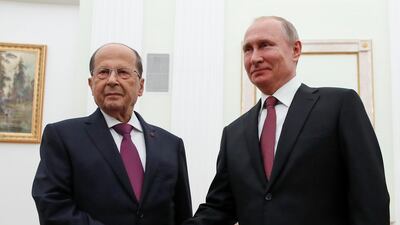Lebanese president Michel Aoun said in Moscow on Tuesday that US president Donald Trump’s decision to recognise Israel’s 1981 annexation of the Syrian Golan Heights was a “black day for the world” and an “arbitrary action” that goes against international law.
Mr Aoun made the comments ahead of a meeting with Russian President Vladimir Putin as part of his first official visit to Moscow, a two-day trip which he said aims to “develop cooperation and strengthen friendship”.
Ties between Russia and Lebanon, traditionally a Western-leaning country, have intensified since Mr Aoun was elected president in October 2016.
On Monday, US President Donald Trump formally recognised the Golan Heights as Israeli territory during talks with Prime Minister Benjamin Netanyahu. The move was criticised by most of the international community, including Russia.
Kremlin spokesperson Dmitry Peskov said: “Such moves undoubtedly have negative consequences from the point of view of a settlement in the Middle East and the general atmosphere of political settlement in Syria."
Officials in Moscow have also suggested Washington should recognise Russia’s annexation of the Crimean Peninsula from Ukraine, which occurred five years ago this month. Maria Zakharova, the Foreign Ministry spokesperson, wrote on Facebook that by the same logic, recognition of Crimea should “follow automatically.”
Lebanon fears the US could also recognise Israel's claim to the Shebaa farms, a small strip of land located close to the Golan Heights also disputed between Lebanon and Syria. "There needs to be a quick and serious move by the Lebanese state to reaffirm [its attachment] to these territories", wrote pro-Syrian Lebanese daily Addiyar on Tuesday.
Before leaving for Russia, Mr Aoun also made it clear that he hoped to strengthen Russian support for a plan to return nearly one million Syrian refugees hosted by his country since the beginning of the civil war in 2011.
In July last year, Russia launched an initiative to facilitate the return of hundreds of thousands of Syrian refugees in neighbouring countries including Lebanon. Russia’s efforts however have fizzled over a lack of funding from Western countries due to human rights concerns.
In a thinly veiled threat to Europe, Mr Aoun said on Tuesday after his meeting with Duma Chairman Vyacheslav Volodin that “it is in Europe’s interest to solve the problem of the displaced, because the difficult economic situation in Lebanon will push them to seek alternatives and Europe will be their first destination.”
Mr Aoun and his allies refer to Syrians living in Lebanon as “displaced” instead of “refugees” to highlight the temporary nature of their stay.
Lebanon and Russia are also increasingly bound by energy contracts. On Tuesday morning, Mr Aoun met Igor Sechin, the head of Rosneft, to discuss state-owned oil giant’s latest investment in oil installations in northern Lebanon. Earlier this year, Rosneft signed a 20-year contract to rent, operate and expand storage facilities near the northern Lebanese city of Tripoli.
Mr Aoun hopes to attract more Russian investments. During a meeting with Russian businessmen on Monday afternoon, he argued that Lebanon will play a “key role” in Syrian reconstruction. The Syrian regime and its allies, including Russia, argue that the Syrian war is essentially over and that Bashar Al Assad has won.

